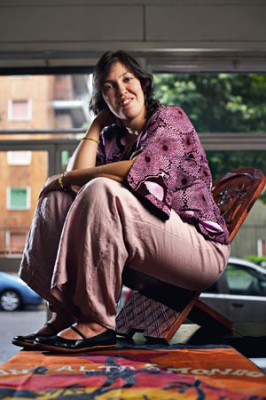Paula Yankillevick
Paula Yankillevick is an ordinary person doing something extraordinary. She is a volunteer working on projects aimed at improving the lives of poor people in Africa.
Paula Yankillevick is an ordinary person doing something extraordinary. She is a volunteer working on projects aimed at improving the lives of poor people in Africa.
Paula Yankillevickgrew up in Buenos Aires, Argentina, in the late 1970s. As a child, she was fascinated by television programmes about Africa. Both documentaries and charitable appeals struck a chord in her that has continued to resonate into adulthood. Today, Yankillevick has turned that chord into a full-time calling: She is a volunteer working on projects to improve the lives of people in Togo, a small country of about 56,000 square kilometres with a population of 5.5 million.
Yankillevick works through a group called UnAltroMondo (Another World), an organization she and 11 others formed in 1998 in Milan, Italy. It is, in turn, a spin-off of the Movimento Umanista (Humanistic Movement), a service organization of social activism with an ethical underpinning also headquartered in Italy.
Yankillevick moved from Argentina to Milan in 1992, when she was 17. “I didn’t speak any English,” she recalls, “so I decided not to attend university. I started working, at first as a baby sitter – because you don’t have to know the language perfectly – then for a financial institution.”
After five years, she left to open a shop featuring arts and crafts from Africa and Asia. She closed that business after two years and took on a series of jobs that related to people and communications – working at call centres, help lines and the like. For the past three years she has been an executive assistant at a telecommunications company. She left that job in May 2006 to devote herself to UnAltroMondo full time, alternating between Milan and Togo. “I finally realized that I don’t want to live my life behind a desk,” she says, laughing.
Her involvement with Movimento Umanista began shortly after she arrived in Milan. She struck up a casual conversation with a member of the group and was attracted by the group’s philosophy as expressed in its motto: “Nothing is more important than human beings, and no human being is less important than any other.” Because she agreed with what the group was doing, she decided to become more involved. “It seemed like a way to do something I believed in and also to get to know my neighbourhood and its people better,” she explains.
Her family was living in northeast Milan, where the group had developed projects for children and the aged, focusing on community building and conflict resolution. Over time Yankillevick became more and more active. “We created UnAltroMondo to take what we were doing in Italy and apply it at an international level,” she explains. “Because one of the founders had contacts in Mali, we started there. It made sense because Mali is one of the poorest countries in the world – the fourth poorest, according to United Nations rankings. We started with a programme against malaria, working with the local people to sensitize them to the issue.”
What differentiates the assistance of UnAltroMondo from other aid organizations in Africa is that they are offering humanism rather than humanitarianism, according to Yankillevick. She explains that humanitarianism is in some respects passive: It donates goods and services to people but doesn’t motivate them to change their circumstances. Humanism does.
“With humanism, the people who benefit from our actions are involved from the outset in what projects to develop together,” she explains. Some humanitarian organizations are beginning to move in this direction as well, but in her view too many are still involved in old-style aid development.
The success of UnAltroMondo’s programmes in Mali encouraged its creators to expand elsewhere in Africa, first in Senegal, and then, three years ago, in Togo. Togo ranks slightly higher than Senegal and Mali in economic well-being: The UN ranks it 143 in poverty out of 177 countries (Senegal is 157, and Mali is 174). Togo has rich soil, phosphates and limestone, and was once known as the pearl of Africa.
However, the country has suffered under almost four decades of non-democratic ruling, and the econ-omy is undeveloped. International human rights organizations have criticized Togo, leading to the UN removing it from its list of aid recipients.
Nevertheless, Yankillevick is optimistic. “Togo has lovely scenery, natural resources, wild animals and six distinct eco-systems,” she says. “Faure Gnassingbe (elected president in 2005) has studied in the US and is open to modernizing. And the European Union gives some aid.”
UnAltroMondo’sprojects in Togo include micro-credit projects, public awareness about AIDS, information about food hygiene, support to a school with 400 students and aid to orphanages. Yankillevick works directly with 10 Togolese, whom she found over the Internet. They in turn coordinate the
activities of 300 volunteers throughout the country. “I chose to concentrate on Togo because there were fewer projects going on there, so it seemed like my work could make a difference,” she says.
What Yankillevick loves most about her stays in the country are the people. “Togo is very welcoming, hospitable and friendly,” she says. “People have a true sense of community. They are eager to improve their situation. They have almost nothing material so their values are pure – family, friendships and relationships.”
Yankillevick recalls that she started out wanting to give something to Africa and its people, “but I have received much more from them,” she says. “The Togolese have much to teach us. It’s wonderful to work with these people and help them build their future.”


